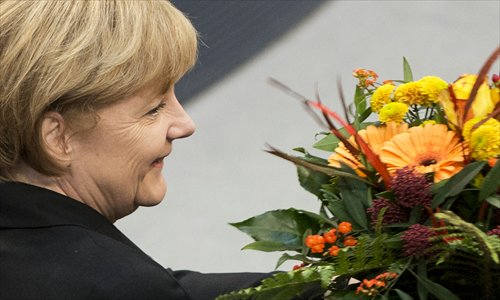HOME >> WORLD
Envoy: Germany keeps continuity in China policy
By Sun Xiaobo Source:Global Times Published: 2013-12-18 0:38:01

German Chancellor Angela Merkel looks at flowers she received after being re-elected in a vote at the Bundestag (lower house of parliament) on Tuesday in Berlin. Photo: AFP
The new German coalition government will keep the continuity of its policy toward China and seek to deepen its ties with China in various fields, Michael Clauss, German ambassador to China, told the Global Times in an interview on Monday.
German Chancellor Angela Merkel unveiled a new coalition government on Monday and Frank-Walter Steinmeier of the Social Democrats became the new foreign minister. Merkel was elected to a third term as chancellor by her parliment on Tuesday.
Of the two figures most important to China policy, Merkel herself is a good friend of China and Foreign Minister Steinmeier made achievements in developing Sino-German relations, building a close partnership with China. Hence, Germany's foreign policy with China will be marked by continuity, the ambassador underlined.
In the coalition agreement, relations with China figure very prominently, also compared to other Asian countries.
The intimacy between China and Germany is also proved by three high-level visits already envisaged for 2014: Ambassador Clauss expects Chancellor Merkel to visit China. Chinese President Xi Jinping has been invited to visit Berlin by German President Joachim Gauck and Chancellor Merkel. Chinese Premier Li Keqiang is expected to head the Chinese delegation for the third round of joint cabinet meetings to be held in Germany, the ambassador said.
In addition to high-level interaction, China and Germany also enjoy excellent relations in economic partnership and both intend to expand mutual trade, said Clauss, adding that both sides also want to deepen people-to-people exchanges by boosting travel, language learning and other cultural activities.
The recently-held Third Plenary Session of the 18th Communist Party of China Central Committee launched an ambitious economic reform plan, which guides China in transforming from an investment-driven economy to an innovation-driven one. In this process intelligent solutions and advanced technologies are highly needed, to which Germany can make crucial contributions, Clauss said.
Regarding a possible China-EU free trade agreement, Clauss stressed that there is an agreed position within the EU on this matter: The first step for the two sides should be an investment protection agreement, which works to replace the current EU-China bilateral investment agreements and, more importantly, would further open the Chinese market to foreign enterprises. In a second step free trade negotiations could be started. Following this order would be crucial, he said.
Posted in: Europe